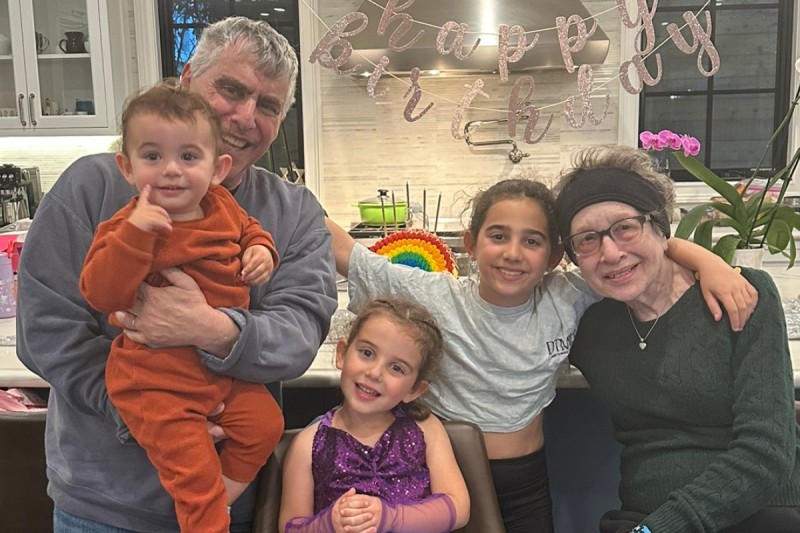
Meryl Jacobs, shown here with her husband, Glenn, and her three grandchildren, is grateful she participated in a clinical trial for pancreatic cancer at MSK.
The U.S. Food and Drug Administration (FDA) has granted accelerated approval to zenocutuzumab (Bizengri®) for treating patients with advanced pancreatic cancer or non-small cell lung cancer (NSCLC) that has an alteration called an NRG1 gene fusion and whose disease progressed after other treatments.
The approval, on December 4, 2024, was based on a phase 2 clinical trial led by Memorial Sloan Kettering Cancer Center (MSK) early drug development specialist and gynecologic medical oncologist Alison Schram, MD.
Zenocutuzumab Provided a New Treatment for a Patient With Stage 4 Pancreatic Cancer
One of the MSK patients to benefit from this trial is Meryl Jacobs, who decided to participate after seeking a second opinion at MSK for treating stage 4 pancreatic cancer.
Meryl, a psychotherapist and grandmother of three in New Jersey, is an unusual case: When she came to MSK in 2020, she had already survived for 12 years after her initial diagnosis. The prognosis for pancreatic cancer for most patients with advanced disease is less than five years.
Getting Tumor Molecular Testing at MSK
In 2012, after four years of treatment at another New York-area hospital, Meryl underwent surgery there to remove her pancreas and the surrounding tissues. But the cancer kept coming back. The standard chemotherapy she was receiving was grueling, and she wanted to find another option.
“I did a lot of research, and everything pointed to MSK,” Meryl says.
At MSK, in-depth analysis of her tumor revealed an NRG1 gene fusion, which is found in less than 1% of all cancers. The most common types are NSCLC and pancreatic cancer. The tumor testing results suggested that she had an NRG1 gene fusion driving her pancreatic cancer and therefore was likely to respond to zenocutuzumab (also known as MCLA-128).
Today, Meryl, 76, is doing well. “MSK saved my life,” she says. “I am so grateful.”
Study Results for Advanced Pancreatic Cancer and Other Metastatic Cancers
The data that resulted in the FDA approval for zenocutuzumab with NRG1 fusions came from an international clinical trial led by Dr. Schram, called the eNRGy study. Data from 64 patients with NSCLC and 30 patients with pancreatic cancer were considered in the FDA’s review.
- All the patients in the study had NRG1 fusions and had stopped responding to other treatments.
- Patients with other types of cancer were enrolled in the trial as well, including breast cancer, colorectal cancer, and bile duct cancer (cholangiocarcinoma).
- Most patients had some degree of tumor shrinkage.
- For pancreatic cancer, 40% of patients responded; for NSCLC, the response rate was 33%.
“The clinical benefit is very meaningful, particularly for this population of patients whose cancer has generally progressed on standard therapies and who have limited options,” Dr. Schram says.
How Zenocutuzumab Was Developed to Treat Cancers With NRG1 Fusions

Dr. Alison Schram, an early drug development specialist, is leading the clinical trial for zenocutuzumab, a drug that targets NRG1 fusions.
Zenocutuzumab was originally created to treat cancers with high levels of the protein HER2. In 2018, MSK thoracic oncologist and Early Drug Development Service Chief Alexander Drilon, MD, published a case study in Cancer Discovery that found that antibodies targeting the related protein HER3 could slow the growth of tumors with another type of alteration, the NRG1 gene fusion.
Based on Dr. Drilon’s findings and their own laboratory research, the company that makes the drug decided to develop it for cancers with these mutations. Dr. Schram was tapped to lead the clinical trial, which was open to patients with any kind of cancer that carried the alteration — an approach called a “basket trial.”
How Zenocutuzumab, a Bispecific Antibody, Works
Zenocutuzumab is a type of drug called a bispecific antibody. It works by preventing cancer cells from sending the signals that boost their growth. It also makes cancer cells more visible to the immune system, drawing immune cells in to destroy the tumor.
Testing DNA and RNA Is Important for Precision Oncology
Most patients are matched with targeted therapies based on DNA gene mutations found with tests like MSK-IMPACT®, which looks for mutations in more than 500 cancer-related genes. However, the NRG1 gene is too large to be included in these panels. Because RNA testing focuses on the cell’s messenger molecules, it can more accurately detect these cancer-causing fusions and inform potential treatments.
“Cancers with NRG1 fusions usually don’t have other gene mutations known to drive cancer,” Dr. Schram says. “If we analyze a tumor and don’t find any driver gene mutations, at MSK, we now perform RNA testing.”
That’s what happened in Meryl’s case. When she first came to MSK, she met with gastrointestinal medical oncologist Eileen O’Reilly, MD. Dr. O’Reilly obtained a tumor sample from Meryl’s most recent biopsy. The tissue was analyzed with MSK-IMPACT. When the test didn’t turn up any mutations that could be targeted with drugs, Dr. O’Reilly decided that her tumor should be tested for RNA mutations as well. That test revealed the NRG1 fusion, which led Meryl to Dr. Schram and the zenocutuzumab trial.
“I was very excited, because here was a treatment that was not chemotherapy,” Meryl says. “Also because I knew there was a good chance it would help me.”
Zenocutuzumab Has Few Side Effects
Results from the trial showed that the drug’s side effects were mild. The most common were fatigue, rashes, and gastrointestinal side effects.
“The chemotherapy that these patients had previously received can be really tough,” Dr. Schram says. “Most patients in this trial felt better right away.”
Meryl had very few side effects. “I started feeling much more normal almost immediately,” she says. “Yes, I still had cancer, but this treatment was not so terrible.”
The phase 2 trial is still recruiting new patients at MSK. Dr. Schram expects that eventually zenocutuzumab may receive approval for all cancers caused by NRG1 fusions.
Convenient Pancreatic Cancer Care Near Home and More Time With Family
Meryl traveled to MSK in Manhattan every two weeks, where she received IV infusions of zenocutuzumab. She was able to have her regular scans at MSK-Bergen, which is closer to her home. Later, when she needed radiation therapy, she also went to MSK-Bergen for treatment with radiation oncologist David Guttmann, MD, MTR.
Meryl recently stopped receiving zenocutuzumab after four years, because it was no longer working for her. She has started taking another targeted therapy, a pill called afatinib (Giotrif®).
Now retired, she is grateful that her treatment at MSK has allowed her to spend more time with her husband and her daughters, and to see her three grandchildren grow up.
